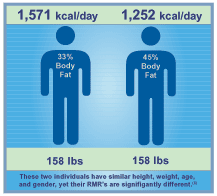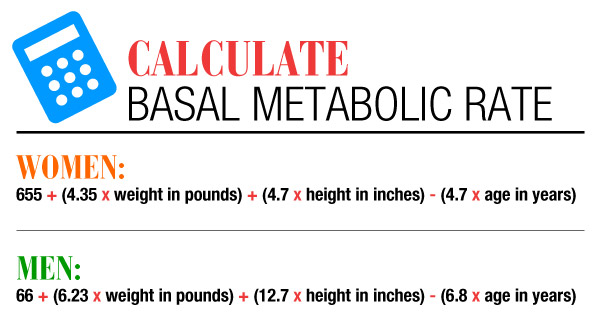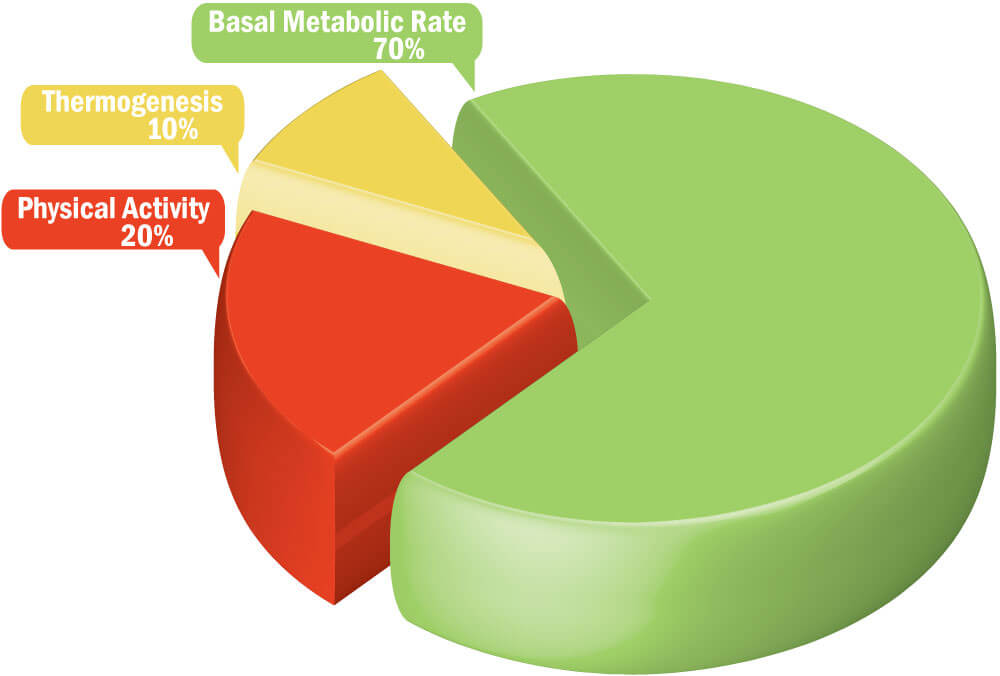Is it possible to lose weight if you stay in bed all the time and do nothing? Sure, as long as you eat just enough to stay alive.
What is BMR?
The energy needed for our body to function at rest, while doing nothing, is called basal metabolic rate or BMR. It is the energy needed for our heart, brain, kidneys and other organs to operate and keep us alive. Simply put, this is the number of calories you’d burn if you stayed in bed all day. It does not include exercise, typing on the computer, yard work, walking, talking, sitting, driving your car, shopping or even thinking for that matter. Yet, your BMR is important because it accounts for 60% to 70% of calories you burn each day. Nearly two thirds of the calories you burn every day are the result of your BMR which includes calories burned for basic bodily functions such as breathing, blood circulation and maintenance of body temperature. So many people don’t realize this, but BMR is truly a key factor in weight loss.
Why is it important to know our Basal Metabolic Rate?
We are all different and we spend different amount of food to provide energy for our basic functions. Once we know our basal metabolic rate, we can also calculate how much we need to eat in order to keep healthy weight. Basal metabolic rate is calculated while we are at rest, when we do not spend energy for any activity except for the basic functions for our survival. Basal metabolic rate depends on our sex, age, weight and height. Once we know how much energy (food) we need to survive, we can also calculate how much calories from food we need per day, depending on our lifestyle, kind of work we do and the amount of physical exercise.
Things that Affect BMR
Diet
Diet is something you can control and just about everyone knows their diet is important for weight loss, but did you know that reducing your calorie intake too much can result in your BMR dropping as much as 20 to 30%? You need to create a calorie deficit if you want to lose weight, but you have to be careful that you don’t reduce your calorie intake too much or your BMR will decrease. It doesn’t make sense to go on an extreme calorie reduction diet that causes your BMR to also decrease. The smarter way to lose weight is to reduce your calorie intake more moderately and then to also increase your calories burned by exercising more. The American College of Sports Medicine (ACSM) says that the daily calorie level consumed for women should never drop below 1200 calories per day and 1800 calories per day for men. In, some cases this may still even be too much of a reduction and could cause your BMR to drop significantly.
Lean Body Mass
The most prominent factor that affects your BMR….lean body mass. Simply put, the more muscle you have the more calories you will burn. Many women are afraid of lifting heavy weights out of fear of gaining weight. Unfortunately, this myth really does a lot of damage by persuading a lot women not to strength train.
The reality is that the only way to gain weight is to consume more calories than you burn.

Weightlifting burns calories and does not cause weight gain. If you gain weight during a strength training program it is not from the weightlifting, but instead comes from the excess calories you have consumed or temporary water weight gain. Without a positive caloric balance it is impossible to gain bodyweight. Let’s look at it this way, regardless, if you weight train or not, you will gain weight if you consume more calories than you burn each day. These extra calories will mainly be turned into body fat by the person who does not train with weights, while the same extra calories consumed by the person who trains with weights will be used to create new muscle tissue. You might be thinking that you would rather do cardio instead of lift weights to burn those extra calories. But remember, lifting weights develops lean muscle mass and since muscle takes up about one third the space of fat, you will not only look leaner, but will also increase your BMR. Since your BMR is responsible for most of the calories you burn each day you would be foolish not to take advantage of the best way to increase it. And guess what? Increasing your lean body mass increases your BMR and that translates to burning more calories all day long, even while you’re sleeping.
Age
As you age, incorporating a thorough weight lifting program becomes even more important because your BMR will decrease about 2% every decade after the age of 20. This may not seem like a lot, but a 2% decrease for a person with a BMR of 1500 means they would burn 30 calories per day less than they did the decade before. This translates into a weight gain of nearly 3 pounds per year without taking into account any increase in calories consumed or decrease in their activities or exercise routine. This best way to counter the decrease in your BMR as you age is to increase your lean body mass and turn your body into a fat burning machine all day long!
Formula for Calculating BMR
There are many automatic calculators of basal metabolic rate available online, but if you want to know how it is calculated, here is the formula, different for women and men:
Women: BMR = 655 + (4.35x weight in pounds) + (4.7 x height in inches) – (4.7 x age in years)
Men: BMR = 66 + (6.23x weight in pounds) + (12.7 x height in inches) – (6.8 x age in years)
Of course, this formula works for most people but not all. One variable that is not taken into consideration is lean body mass. Muscles spend more energy for survival than fat tissue, so people with lean, mean bodies need more energy to survive. That also means that obese people, who have much more fat tissues than muscle mass, need less energy to live, and have lower basal metabolic rate. Â So, now you understand why some of your friends can eat anything and stay lean. Not only that they spend a lot of calories while exercising and building all those muscles, but muscles themselves burn calories even while doing nothing. Â If you ever needed a reminder why exercising is so important, this is just another one of many. Basal metabolic rate can be calculated using the formula based on sex, age, weight and height, and the obtained result is fairly accurate.
Click here to calculate your BMR online:Â http://www.bmi-calculator.net/bmr-calculator/
How to Use BMR for Weight Loss
To lose weight, you have to consume fewer calories than you burn. If you’re in the normal weight range and only want to lose 5 to 10 pounds, you need to take 500 to 700 calories from your maintenance level. For overweight individuals, this rises to 700 to 1,000 calories daily, while obese persons can go for a 1,000 to 1,500 per day deficit. You don’t want to try for a bigger deficit than this, however, as going too low with your calorie intake can lead to lethargy, reduced immune function, an unhealthy relationship with food and large gains in weight post-diet.
Basically, figure out what your BMR is, subtract 500-1000 calories, and do not go below 1200 calories a day for easy, healthy weight loss.

Sources:
https://www.healthstatus.com/health_blog/body-fat-calculator-2/basal-metabolic-rate/


